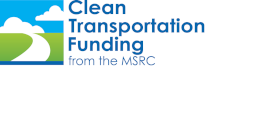
Council Member Mark Henderson from the City of Gardena has been a part of the MSRC for a number of years, becoming one of newest members of the Committee this Spring. Mark previously served as a member of the MSRC’s Technical Advisory Committee and as an Alternate, before joining as a primary member in March.
He was born and raised in Los Angeles County, starting in South Los Angeles and moving to Gardena in his teenage years. Mark said that air quality has always been an issue in the region, especially in communities of color where he has resided mostly all of his life, particularly because of the transportation corridors running through these areas.
“When I got into elected office, environmental justice was one of the things I was a proponent of, making sure we removed blight and addressed air quality,” Mark said. “Being a part of SCAG (Southern California Association of Governments) and then getting appointed to the MSRC was a great opportunity to start really working on the issue of better air quality for communities overall.” He has been a member of SCAG for more than three years, where he has been a part of the Community, Economic & Human Development Committee, and Chaired the Racial Equity and Housing Committee.
Mark has been working in the public sector for the majority of his career. After serving in the U.S. Navy, he earned a Bachelor of Science degree in Telecommunications Management, a Master of Business Administration, and a Doctorate in Organizational Leadership. He has brought all of these skill sets together to better serve the community. “I felt like I had something I could add to the body politic, and I felt there were a lot of things that were lacking that I wanted to bring to the forefront, which is why I wanted to serve as an elected official.” (See photo of Council Member Henderson at a local Earth Day event)

He feels that joining the MSRC is key to getting a regional understanding of transportation and air quality issues in Southern California. “It’s important to understand the decisions other agencies are making in relation to air quality. Getting the opportunity to be a diverse participant on the Committee is critical to bringing information back to the community to talk about what’s being done for air quality around the region especially in communities of color.” He says the MSRC makes good decisions to support the reduction of air pollution in the region.
“With the MSRC, it’s not just about awarding funding, it’s making sure that there are allocations to projects that come to fruition and bear fruit. The MSRC is very diligent in making sure the funding is given to projects that are seen all the way to the end. It’s great that there is this extra funding out there to support clean air projects around the region.”
In his work with the MSRC, he hopes to focus on projects that help reduce emissions from trucking corridors. “Air pollution doesn’t know any city boundaries, so if we start working on it in one area it will have a ripple effect in other areas.” He also wants to work on bringing down the cost of lower emission and zero-emission vehicles and infrastructure so that they are affordable for many of the communities that may be disadvantaged and disenfranchised. “I want to ensure these communities are active participants in this new shift to being climate conscious,” he remarked.
Looking toward the future of transportation in Southern California, Mark thinks we will still be relying on a variety of fuels. “Getting off fossil fuels is easier said than done. There is still not enough EV infrastructure everywhere like there are gas stations. Because of affordability, fossil fuel vehicles will still be around for a while; until we really start making the price of electric vehicles affordable it’s going to be an issue. Not everyone can afford a Tesla or a Polestar if you can’t have a living wage.”
“The MSRC’s work is definitely aspirational, and many things are being achieved, but at the rate we are going it is still going to take some time – a rising tide lifts all boats and we need to lift all communities at the same time, and the MSRC helps to achieve that.”
